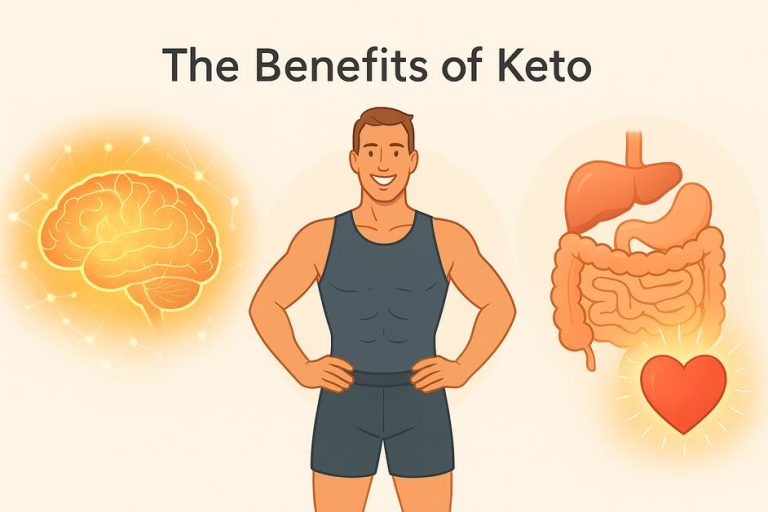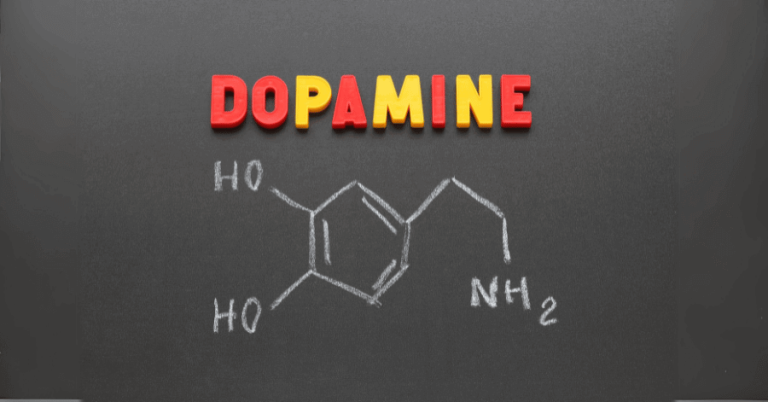In an era overflowing with medical breakthroughs, designer diets, and more scientific research than ever before, you would think we would be the healthiest humans in history. But strangely, the opposite seems true.
Chronic illness is soaring. Autoimmune conditions, obesity, anxiety, fatigue—you name it—are all at all-time highs. Despite the endless pills, powders, and protocols, our collective health is unraveling. It’s as if the more we add, the more we lose.
Enter the ketogenic diet—a nutritional approach that doesn’t aim to pile on more complexity, but instead strips things back to something far more primal. It doesn’t require exotic ingredients or complicated routines. It works by removing the very foods and habits that push our biology out of balance, reconnecting us with how our bodies were designed to function.
In a world where we’re told “the science is settled” the truth about nutrition is anything but. That’s why in this article, we’ll unpack the latest research behind the ketogenic diet—alongside real-world stories from people who’ve reversed everything from brain fog to blood sugar issues.
By the end, you may begin to wonder if many of today’s most common health problems all trace back to the same root—and if ketosis might be the switch we’ve been missing.
What is the Ketogenic Diet?
The ketogenic diet is a way of eating that shifts the body’s primary fuel source from carbohydrates to fat. By drastically reducing carbohydrate intake—typically under 50 grams per day—your body enters a state called ketosis, where it produces energy-rich molecules called ketones from stored fat.
While often described as high-fat and low-carb, keto is best defined by its metabolic effect: lowering insulin and blood sugar to trigger fat burning and ketone production. This can be achieved through food alone or paired with fasting, exercise, or calorie restriction.
A typical keto macronutrient breakdown is:
- Fat: 70–80%
- Protein: 15–25%
- Carbs: 5–10%
But keto isn’t one-size-fits-all—it can be adapted to your lifestyle, whether animal-based, plant-based, or even strict carnivore. The goal is metabolic flexibility, not dietary rigidity.
Originally developed in the 1920s to treat epilepsy, keto has since been used for conditions like Alzheimer’s, migraines, obesity, and type 2 diabetes—thanks to its benefits for brain function, inflammation, and metabolic health.
That said, food quality matters. A nutrient-rich, whole-food-based keto diet will offer far more benefits than one filled with processed oils and low-quality meats.
Ultimately, keto is a metabolic state, not a specific food list. If you’re in ketosis, you’re doing it right, however you get there.
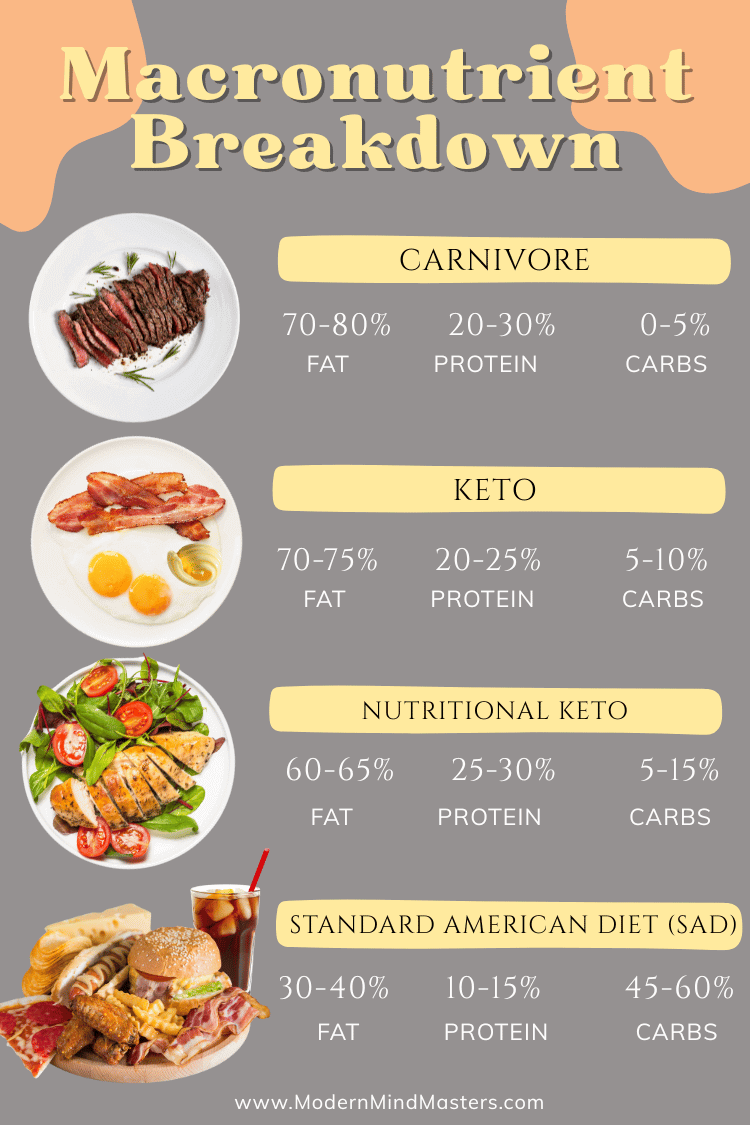
The Benefits Of The Ketogenic Diet
1. Metabolic Health
Metabolic health is a term often thrown around for general health, but it has a specific meaning: how well your body processes and regulates energy from food. I believe metabolic health to be the single most overlooked aspect of health and responsible for the majority of diseases and illnesses that plague the Western world. It is also surprisingly avoidable once you learn the basic biology behind cellular health.
Essentially, metabolic health relates to how well your body manages energy and nutrients to keep you functioning properly. Think of it as the engine of a car—when it’s running smoothly, you feel good, have steady energy, and stay in good shape. When metabolically dysfunctional – which a 2018 study found that a staggering 88 percent of Americans are – you are likely to experience weight gain, fatigue, brain fog, or even deadly conditions like diabetes and heart disease.
The body and brain regulate metabolic health primarily through blood sugar, insulin, cholesterol, and fat metabolism. A metabolically healthy body has good mitochondrial function, the process by which mitochondria (the powerhouse of the cell) generate energy (ATP) from nutrients and oxygen to power cellular activities. Such activities even extend to hair follicles on the scalp, with metabolic disorder and insulin resistance leading to hair loss.
The ketogenic diet, where one is fueled by ketones from fat as opposed to glucose from carbohydrates, offers three crucial benefits for metabolic health, especially for those already experiencing metabolic disorders such as low energy levels, inflammation, weight struggles, poor sleep, and poor cardiovascular markers.
Firstly, ketones are faster to process into energy than glucose. Turning glucose into energy (acetyl CoA) takes 13 chemical steps, whereas ketones need only three. This matters because if something goes wrong in one of the 13 glucose steps (like we see in bipolar disorder), ketones can still provide energy by skipping those steps entirely (one reason why keto diets have shown promise in treating neurological disorders).
Secondly, ketones use a different energy path than glucose. When glucose or ketones are broken down, their electrons are sent to the energy-making process via two “couriers”: NAD or FAD (coenzymes).
Glucose relies more on NAD, which goes through a specific part that can malfunction in conditions like autism or schizophrenia. Ketones use FAD more, skipping that trouble spot, so they can still work even if the glucose path is not functioning well.
Thirdly, ketones require very little insulin to be used by the body. Unlike glucose, which depends on insulin to enter cells—especially in the brain—ketones can be readily used for energy even when insulin levels are low or when insulin isn’t working properly, such as in insulin resistance. This makes ketones an efficient and reliable fuel source in situations where glucose metabolism is impaired.
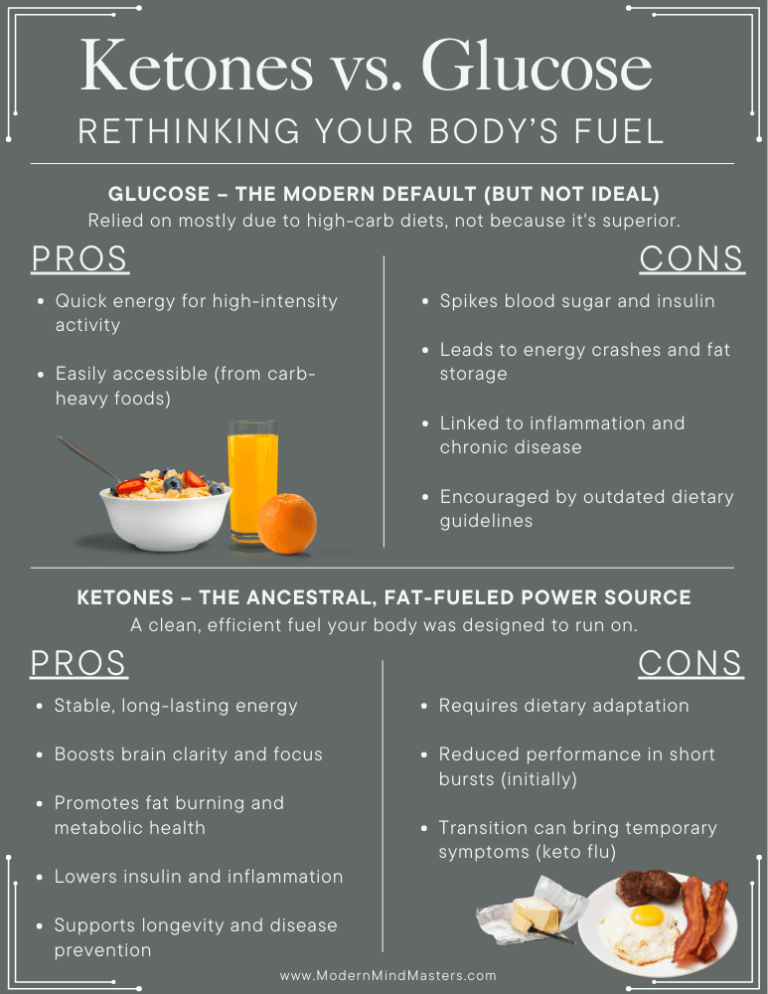
Together, these benefits mean most of us would benefit in some way from spending some time in ketosis. The primary metabolic health benefits of keto diets include:
- Diabetes Control
Since keto is a low-carb diet, it significantly reduces the intake of sugars and starches that are the primary cause of blood sugar spikes. By minimizing carbohydrate intake, the body doesn’t experience the usual rollercoaster of rises and crashes in blood glucose levels.
With fewer carbs to process, the body requires less insulin to regulate blood sugar levels. Over time, this can improve insulin sensitivity, meaning your cells respond better to insulin, reducing insulin resistance—a key factor in type 2 diabetes.
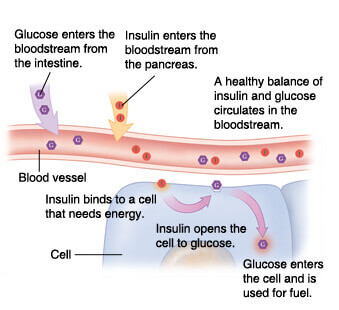
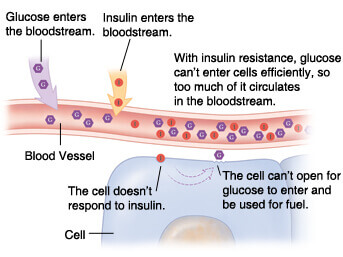
2. Reduced Inflammation
With fewer glucose spikes from high-carbohydrate diets, the body experiences reduced inflammation through lower blood sugar levels, the production of anti-inflammatory ketones, decreased oxidative stress, and improved gut health.
One of the biggest contributors to chronic inflammation is high blood sugar and insulin resistance, both of which drive the production of inflammatory molecules such as cytokines and advanced glycation end products (AGEs). By eliminating sugar and refined carbohydrates, keto prevents frequent blood sugar spikes, thereby reducing insulin levels and inflammatory responses in the body and brain.
This is evidenced through many recent studies which have consistently shown that a ketogenic diet reduces inflammation markers. The anti-inflammatory effect is thought to be due to the production of ketones, particularly beta-hydroxybutyrate (BHB), which acts as a signaling molecule that suppresses inflammatory pathways.
Additionally, ketones help reduce oxidative stress, a condition in which excess free radicals cause cellular damage and trigger inflammation. By improving mitochondrial function and increasing antioxidant activity, keto helps mitigate oxidative damage that is often exacerbated by high-carb diets.
3. Polycystic Ovarian Syndrome (PCOS)
Due to its critical role in regulating metabolism, insulin is one of the most powerful hormones in the body. It makes sense then, that a dysfunction in insulin levels has a profound effect on aspects of health that are dependent on it.
One such area is reproductive health, especially polycystic ovarian syndrome (PCOS), a reproductive issue that affects around 10 percent of women and is increasing.
PCOS has been closely linked to metabolic issues, particularly insulin resistance, and keto helps address this issue head-on. Studies show that low-carb diets reduce fasting insulin, lower testosterone levels, and improve insulin sensitivity, thereby easing PCOS symptoms.
4. Fatty Liver Disease
Fatty liver disease, particularly non-alcoholic fatty liver disease (NAFLD), is primarily caused by insulin resistance, excess carbohydrate consumption, and metabolic dysfunction.
One of the main drivers of fatty liver disease is high insulin levels, which promote fat storage in the liver. In a high-carb diet, excess glucose is converted into fat through de novo lipogenesis (DNL), leading to fat accumulation in the liver.
The ketogenic diet, by drastically reducing carbohydrate intake, lowers insulin levels and shifts the body into a state of fat-burning (ketosis). This allows the liver to release stored fat instead of accumulating more, leading to a reduction in liver fat content over time.
Fatty liver disease is often accompanied by chronic inflammation and oxidative stress, which can lead to liver damage and fibrosis if left unchecked. The ketogenic diet has strong anti-inflammatory effects, primarily through the production of ketones, especially beta-hydroxybutyrate (BHB). BHB acts as an anti-inflammatory signaling molecule, suppressing pro-inflammatory pathways like the NLRP3 inflammasome, which is linked to liver inflammation.
Additionally, keto reduces oxidative stress by lowering blood sugar and increasing antioxidant activity, helping to protect liver cells from further damage.
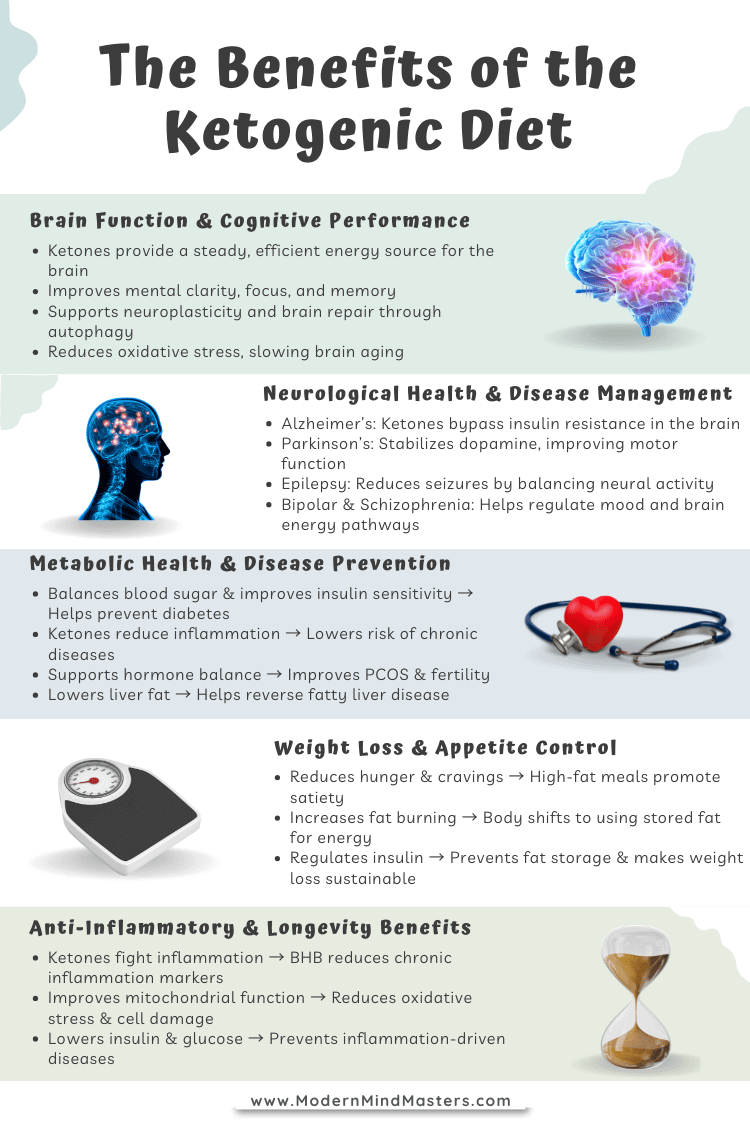
2. Brain Function and Cognitive Ability
While most people focus on the physical benefits of a diet—like fat loss, improved energy, or cardiovascular health—the ketogenic diet stands out for its profound effects on the brain. In fact, many of keto’s most powerful benefits stem not from what it does to the body, but from what it does in the brain.
On the Standard American Diet (SAD), which is typically composed of between 250 to 300 grams of carbohydrates a day, the body runs almost entirely on glucose from these carbohydrates, with insulin correspondingly high to manage the excess glucose.
You might also think that when glucose levels are high in the body, they will also be high in the brain. Paradoxically, the opposite is true. When the body is insulin resistant, the brain can receive less glucose than it needs.
This might seem counterintuitive—after all, if there’s plenty of sugar in the blood, shouldn’t the brain have easy access to energy? The problem is that insulin is needed to help glucose enter certain brain cells, especially in regions involved in memory, learning, and higher cognitive functions. In a state of insulin resistance, this signaling breaks down, meaning those neurons can’t effectively absorb and use the glucose—even though it’s circulating in abundance.
As a result, the brain is essentially starved for energy amid excess. This “energy crisis” in the brain is thought to contribute to cognitive decline and may be one reason insulin resistance is closely linked to Alzheimer’s disease, sometimes referred to as “type 3 diabetes.” Unlike glucose, ketones can fuel the brain without needing insulin, offering a more reliable energy source when glucose metabolism falters.
Many believe ketones, and the state of ketosis in general, to be a backup fuel for the brain, but given the option, scans have shown that the brain prefers to absorb and burn ketones even when glucose is plentiful. While the exact reason for this is unknown, it does suggest that there may be distinct advantages to spending time in ketosis.
Being in ketosis also activates powerful repair pathways that are normally suppressed in a high-carb, high-insulin state. These include autophagy, which cleans out damaged brain cells, and neuroplasticity pathways, which help your brain form new connections—crucial for learning, memory, and long-term cognitive health.
One of the keys to brain health is ensuring that the brain can process glucose at an optimal pace, unhindered by insulin resistance.
Dr. Georgia Ede, author of “Change Your Diet, Change Your Mind”, explains that for a diet to be considered “brain-healthy,” it must nourish, protect, and energize the brain.
While the Mediterranean diet (previously considered the best diet for brain health) excels at nourishing and protecting the brain, it falls short when it comes to energizing. In contrast, the ketogenic diet reliably lowers glucose and insulin levels, making it incredibly effective at addressing insulin resistance and energizing the brain through the production of ketones.
Keeping your metabolism on its toes by regularly switching up its fuel source appears to be one of the secrets of robust mental and physical health. Most of us have lost our metabolic flexibility after years and decades of glucose and carb dependence, and need to begin spending time in ketosis to not only train our body and brain to run efficiently on ketones but also to be able to be metabolically flexible and flip effortlessly between burning glucose and ketones for fuel.
3. Therapy for Neurological Disorders
The ketogenic diet is quickly gaining recognition for its remarkable potential in improving neurological health and treating various brain-related conditions. From Alzheimer’s and Parkinson’s diseases to epilepsy and even bipolar disorder, keto is showing promise as a treatment for a range of challenging neurological disorders.
Alzheimer’s Disease
For those facing Alzheimer’s disease, the brain’s ability to use glucose for energy is often compromised. That’s where ketones come in. By shifting the brain’s fuel source from glucose to ketones, the ketogenic diet helps bypass broken metabolic pathways and supplies a cleaner, more efficient form of energy.
On top of that, keto has been shown to reduce oxidative stress and support mitochondrial health—two critical factors in slowing cognitive decline. Since insulin resistance in the brain is a key feature of Alzheimer’s (sometimes called “type 3 diabetes”), keto’s insulin-independent fuel source offers a glimmer of hope where other treatments fall short.
Parkinson’s Disease
Parkinson’s doesn’t just affect movement—it impacts mood, sleep, and overall quality of life.
Emerging research suggests the ketogenic diet can help ease both the motor and non-motor symptoms of this complex disease. By supporting dopamine-producing neurons and enhancing mitochondrial function, keto may help stabilize the very systems that start to break down in Parkinson’s.
Compared to traditional low-fat diets, keto appears to provide more consistent energy to brain cells, potentially improving focus, reducing tremors, and boosting day-to-day function.
Epilepsy
Long before keto became trendy, it was developed as a medical therapy for epilepsy—and it’s still one of the most effective treatments for drug-resistant seizures. For children and adults who don’t respond well to medication, keto offers a powerful alternative.
By stabilizing brain activity and reducing the excitability of neurons, ketones help calm the electrical storms that trigger seizures. In many cases, patients experience dramatic improvements or even complete seizure remission—all through the natural metabolic shift that keto provides.
4. Inflammation
When it comes to brain health, inflammation is often the silent saboteur. More and more research is pointing to chronic inflammation as a root cause behind conditions like depression, ADHD, autism, and Alzheimer’s. It quietly disrupts brain signaling, damages neurons, and throws critical systems like mood regulation and cognition out of balance. This is where the ketogenic diet really shines.
By stabilizing blood sugar and insulin levels—and shifting the brain’s fuel from glucose to ketones—keto creates a metabolic environment that naturally calms inflammation. Ketones themselves have anti-inflammatory properties, and they help the brain run more efficiently, with less oxidative stress and metabolic strain. For many people, this shift leads to sharper thinking, better mood stability, and noticeable improvements in mental clarity and emotional resilience.
Dr. Chris Palmer, a Harvard psychiatrist, has become a leading voice in this space. In his groundbreaking work on mental illness, including schizophrenia, he highlights how the ketogenic diet dramatically improved symptoms in patients who had tried everything else. In some cases, keto succeeded where medications had failed. His work underscores a powerful truth: inflammation isn’t just a buzzword—it’s a real, measurable force behind many mental health struggles, and keto is proving to be a promising way to fight it.
This isn’t fringe theory. There are hundreds of peer-reviewed studies on platforms like PubMed supporting these findings. But because nutritional therapies don’t fit neatly into the pharmaceutical model, they often get overlooked by mainstream medicine. The science is there—you just have to know where to look.
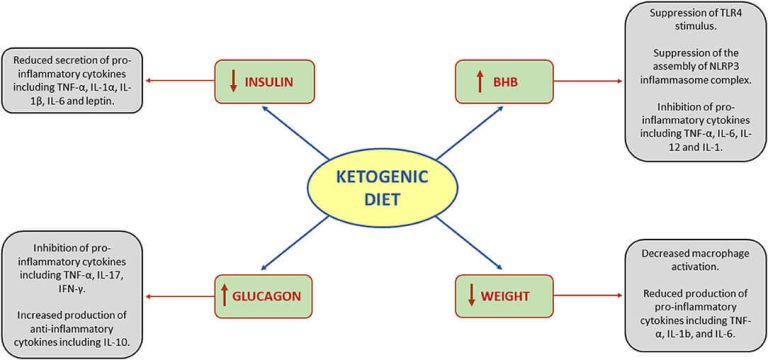
5. Weight Loss
If you are overweight, it is almost impossible to not lose weight on a ketogenic diet. The ketogenic diet is one of the most effective ways to shed fat —and it all comes down to how it affects hunger, metabolism, and insulin levels.
Unlike carb-heavy diets that make it easy to overeat, keto naturally limits your appetite, making it almost impossible not to lose weight if you’re following it correctly.
On a standard high-carbohydrate diet, consuming your recommended daily allowance (RDA) of calories in a single meal is effortless. Just one serving of the Louisiana Chicken Pasta at The Cheesecake Factory will see you consume 2,200 calories (and a terrifying 176g of carbs).
But try doing the same with steak. That would mean eating several pounds of meat in one sitting (around 6 steaks) which is nearly impossible. Protein and fat naturally regulate hunger, meaning you’ll feel full long before you reach the same calorie intake as a carb-based meal.

Beyond just appetite control, keto turns your body into a fat-burning machine. Carbohydrates make up 55 percent of the average American diet, with most people consuming 200 to 350 grams of carbs per day. This keeps insulin levels constantly elevated, locking fat inside your fat cells and making weight loss a battle.
On keto, you drastically reduce carbs, forcing your body to burn stored fat for fuel instead. That’s why studies consistently show that low-carb and keto diets lead to greater fat loss compared to low-fat diets, while also improving metabolic health and insulin resistance.
Keto isn’t just a theoretical weight-loss strategy—it’s something both my wife and I have experienced firsthand. It’s one of the simplest, most effective ways to lose weight without hunger, fight obesity, and improve long-term health. If you’ve struggled with dieting before, keto could be the breakthrough you’ve been looking for.
6. Cancer
Cancer cells have a unique metabolic characteristic—they thrive on glucose. Unlike healthy cells, which can use either glucose or ketones for energy, cancer cells are largely dependent on glucose for fuel.
This phenomenon, known as the Warburg effect, makes cancer cells particularly vulnerable to strategies that reduce glucose availability. This is where the ketogenic diet comes into play. By significantly lowering glucose levels and increasing ketone production, ketosis may slow tumor growth and make cancer cells more susceptible to treatments like chemotherapy and radiation.
Recent research, including studies from institutions like Columbia University, has shown that a ketogenic diet can be an effective adjuvant treatment for several types of cancer, including neuroblastoma, acute myeloid leukemia, and glioblastoma. These types of cancers rely heavily on glucose for their energy demands, and by starving them of glucose, the keto diet may hinder their growth.
The average American consumes around 152 pounds of sugar and 133 pounds of flour each year, both of which provide a constant supply of glucose to fuel the growth of cancer cells. This overconsumption of sugar is linked to a rise in diabetes, obesity, and a variety of metabolic disorders, all of which have been shown to increase the risk of cancers such as pancreatic, colon, breast, and prostate cancer.
When following a ketogenic diet, the body shifts from burning glucose to burning fat, producing ketones as an alternative fuel. Since cancer cells cannot use ketones for energy, they are starved of their primary fuel source. This fuel switch creates a hostile environment for cancer cells while supporting normal, healthy cells.
Studies suggest that by restricting glucose availability, the ketogenic diet may not only help slow tumor growth but also enhance the effectiveness of conventional cancer treatments like chemotherapy and radiation. This synergistic effect could offer cancer patients a new avenue for managing the disease, potentially improving outcomes and reducing the side effects of treatment.
Final Thoughts
For some people, the ketogenic diet is as close as it gets to a magic pill. It offers a powerful metabolic reset—naturally and effectively—without the side effects that often come with medications.
By shifting the body into a state of ketosis, the keto diet taps into an ancient, built-in survival mechanism that promotes rapid fat-burning, improved energy, clearer thinking, and better blood sugar control.
Unlike many mainstream diets, the benefits can show up fast—and they’re often life-changing.
Keto isn’t just a trend. For many, it’s a turning point. A chance to reclaim health, energy, and vitality—starting from within.
FAQs
Why is a keto diet good for you?
By shifting the body into a state of ketosis, the keto diet taps into an ancient, built-in survival mechanism that promotes rapid fat-burning, improved energy, clearer thinking, and better blood sugar control.
Who benefits the most from a keto diet?
The ketogenic diet, where one is fueled by ketones from fat as opposed to glucose from carbohydrates, offers three crucial benefits for metabolic health, especially for those already experiencing metabolic disorders such as low energy levels, inflammation, weight struggles, poor sleep, and poor cardiovascular markers.
What is the ketogenic diet?
While often described as high-fat and low-carb, keto is best defined by its metabolic effect: lowering insulin and blood sugar to trigger fat burning and ketone production. This can be achieved through food alone or paired with fasting, exercise, or calorie restriction.
